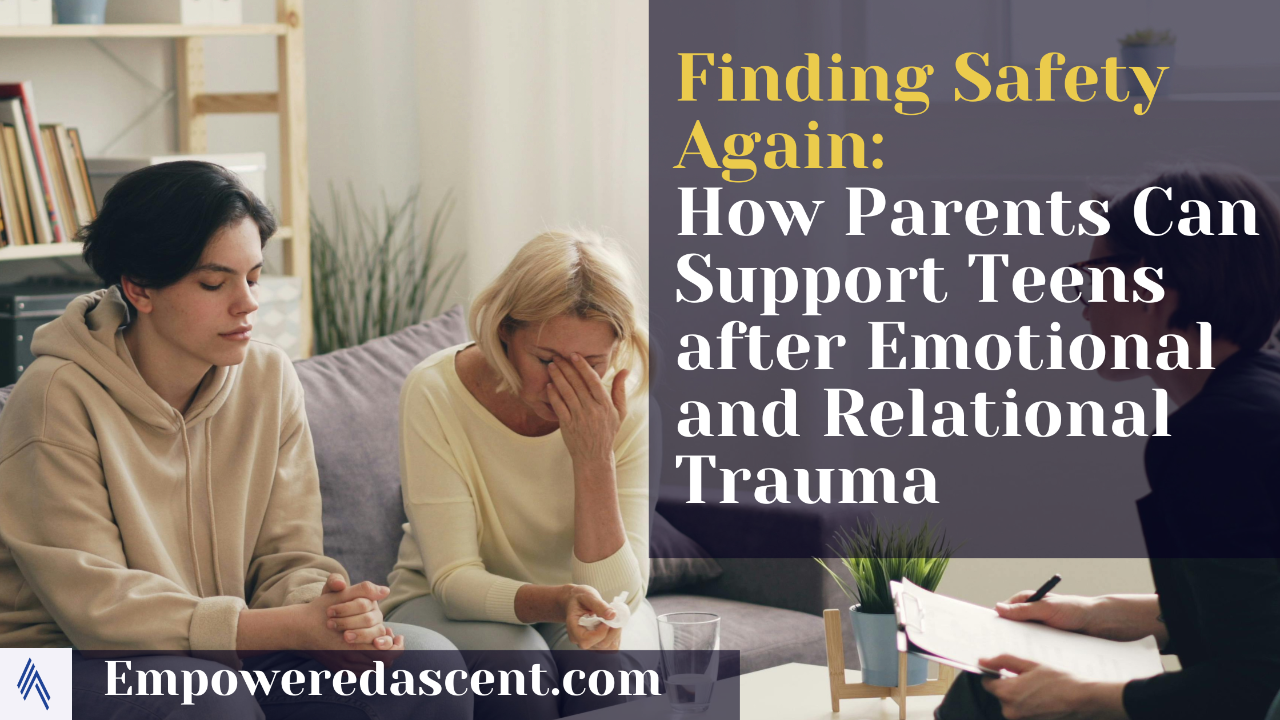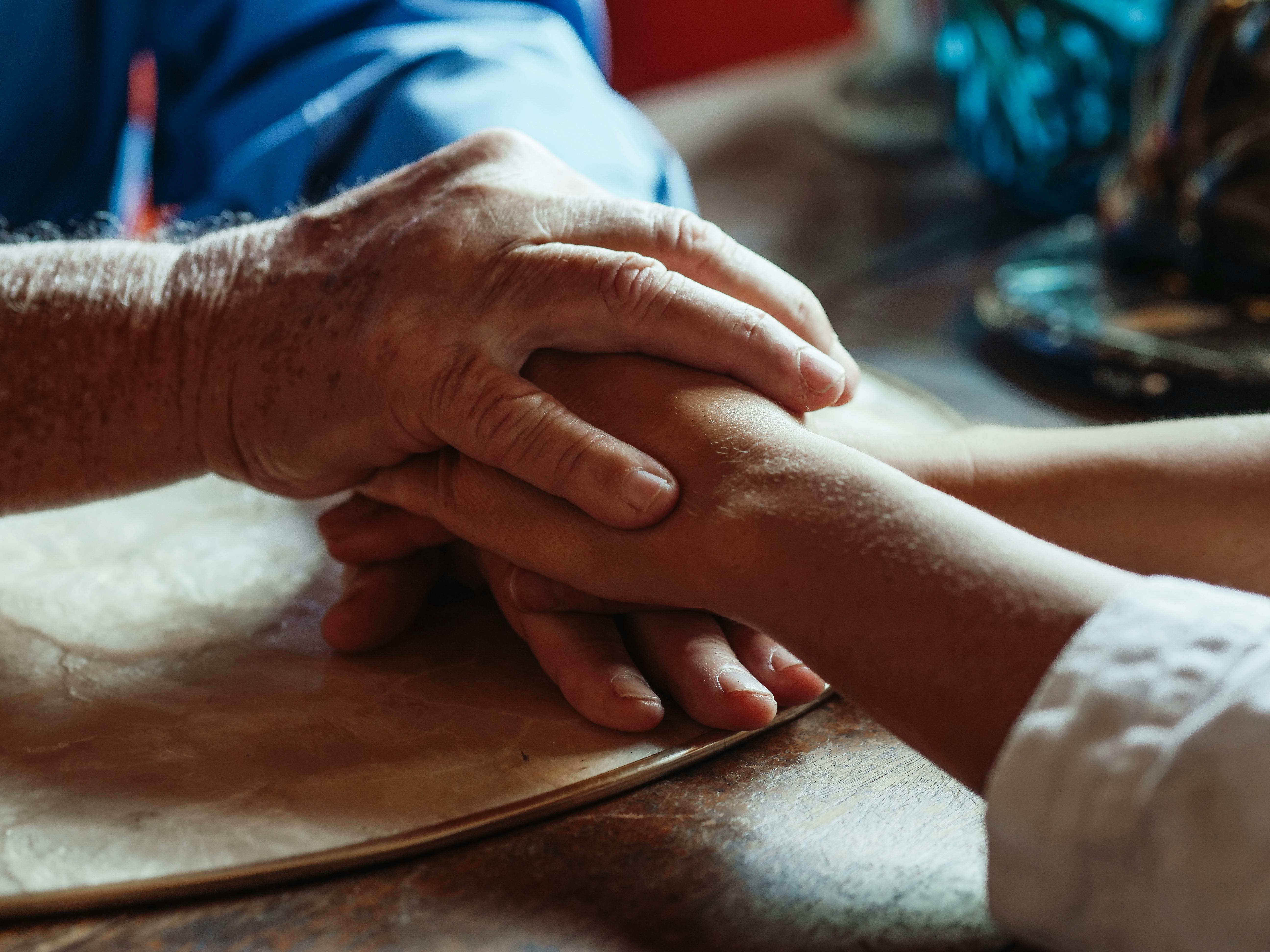
Finding Safety Again: How Parents Can Support Teens after Emotional and Relational Trauma
Oct 01, 2025Why Teens Struggle After Relational Trauma
Teens navigate a lot during their time as an adolescent: building their identity, self discovery, finding their way within social dynamics, etc. On top of all of that, when a teen has experienced relational trauma–either from childhood or as a teen–it can rattle their foundation.
I’ve worked with multiple teens that had unhealthy experiences with different adult figures in their life, including multiple athletic coaches. What seemed to the parent like a strict coach or ”outside of the box” methods had actually bordered on abusive behavior leading to trauma. I’ll share a story of one teen I worked with later in this article — and how a small shift completely changed their ability to feel safe again.
The Hidden Cost of Trauma on Teens

The primary wound that I’ve noticed comes up in most of these cases is one of trust. When someone in a position of authority oversteps or abuses their power, this can trip a safety mechanism within the teen’s mind. “This coach isn’t safe.” → “Adults aren’t safe.” → “People aren’t safe.” Left unheard and unhealed this can lead to withdrawal, unchecked anxiety, and depression.
The other wound that I’ve seen in teens as a result of relational trauma and abuse is even more self-destructive: self blame. “If they are treating me like this, there must be something wrong with me.” This can lead to a host of other issues: lower self confidence, self esteem, social anxiety, and negative self-talk.
My observations are in line with a 2020 study. Researchers interviewed eight retired Canadian national team athletes to explore the long-term effects of emotionally abusive coaching. They found that athletes experienced significant psychological harm during their careers, struggled with identity and mental health after retirement, and often required professional help to recover, with effects lasting for years.
If you suspect your teen might have experienced emotional and relational trauma, or if they’ve confided in you about it, know that this is very serious, and you have the ability to help. Let's dive in.
Common Missteps Parents Make (and What to do Instead)

Parents can make mistakes–even when attempting to help or make things right. One example is disregarding or understating their teen’s experience if or when they bring up the trauma. Trauma can be a lot to grasp and accept. This could be especially true if the parent isn’t confident in their ability to help.
When you hear that your child is dealing with something heavy like trauma, it's also natural to want to jump in and save them from the pain–to fix it. But that isn’t within our capabilities most of the time.
What really helps teens in this situation and what every parent can do:
- Be a good listener: Allow them to share all that they are comfortable sharing and stay focused on them.
- Show compassion, tenderness, and support: “Thank you so much for sharing and feeling safe enough to talk to me. We’ll get you the support you need to heal, and we’ll be with you in your corner.”
- Provide them with resources and encourage them to utilize them: Ensuring they’re getting the right support to heal is critical. “I’d love to get you set up with a licensed therapist who is trained in trauma recovery. I think this’ll be helpful as you heal and recover – Will you give it a try?”
Creating a Safe Space at Home: Helping Your Teen After Trauma

When a teen has gone through something like this, safety has been taken from them. Therefore it's important for parents to do what they can to bring back that sense of safety by creating the opposite experience of the trauma. Here are a few ways you can help:
- Keep intense emotions regulated: A calm, centered presence can do wonders (It also helps them regulate themselves better as you lead through example).
- Praise effort not outcomes: Show support and reward behaviors and things that are directly within your teens control. This rebuilds their sense of worth and self efficacy (more on this in the next section)
- Daily check-ins: Set aside 10 minutes each day to talk with your teen with no agenda. Be attentive and focused throughout the talk, and always leave the door open for more talks. “If you ever need to talk things out more or get anything off your chest–I’m here for you.”
Real-Life Example: Client Journey

Years back when I worked as an athletic coach, I was working with a client who had a bad experience with a prior coach. You can probably take a guess at the sport, as it’s been riddled in controversy throughout recent years.
My client showed potential signs of abusive treatment in the past:
- Extremely hard on themselves in lieu of setbacks or perceived failures.
- Fear that I would be disappointed in them or get angry if they didn’t perform well during training.
- Anxiety around performance metrics in general.
I kept saying things like “I’m just happy you're here putting in the effort.” or “Keep going– I’m proud of you!” whenever they were discouraged and disappointed in themselves about their performance that day. For months we kept working and striving forward. The battles were less about the sport I was coaching them in, and more about how we could come out of each session with mental wins, self belief and confidence boosts.
Fast forward a year or so, and my client was leaving for college. They handed me a letter they had written and said it contained things they wanted me to know. Within the letter they opened up about their experience with a past coach who had been abusive and made them feel unsafe for many years. They told me that I had begun to help them feel safe again for the first time. To this day, the letter sits in my memento collection.
And while for me, it's a testament to the healing power of positive, encouraging mentorship, for those reading this it shows that while there’s challenges ahead, the wounds of relational trauma can begin healing with consistent nurturing and focused care.
Key Takeaways

Relational trauma can shake a teen’s sense of safety and trust, but as a parent, you play a powerful role in helping them heal. The most important things you can offer are your presence, compassion, and consistency. By listening without judgment, creating safety at home, and encouraging supportive resources, you give your teen the chance to rebuild confidence and connection. Healing takes time, but with steady care, it is possible.
If you’re looking for a structured way to reconnect with your teen, I’m putting together a free guide filled with practical steps you can start using right away. Join my email list and I’ll let you know when it’s available for download.
Further Reading:
Kerr, G., Willson, E., & Stirling, A. (2020). It Was the Worst Time in My Life: The Effects of Emotionally Abusive Coaching on Female Canadian National Team Athletes. Women in Sport and Physical Activity Journal, 28(1), 81–89.
A Simple Guide to Reconnect With Your Teen
Parenting teens can be confusing, exhausting, and sometimes frustrating — even when you love them more than anything. This free guide breaks down the 3 foundations of trust and communication, with practical exercises and scripts you can use right away to strengthen your relationship.
Instant PDF download. No spam, just helpful guidance.

